×
The Standard e-Paper
Join Thousands Daily

The much-hyped end of Kenya Power’s monopoly might not offer electricity consumers relief from high power bills after all, a State official has warned.
Energy Principal Secretary Joseph Njoroge said setting up another power distributor to rival the utility firm would require huge investments in new infrastructure, making it unattractive to energy industry players.